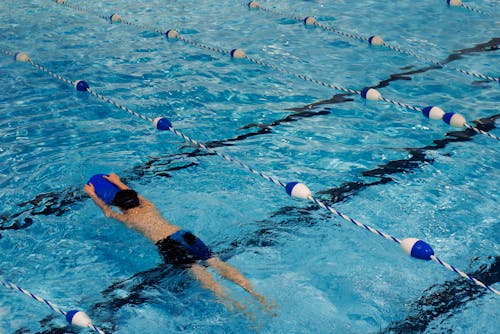
If your neighbourhood has a community centre with a heated swimming pool, you live near a body of water, or you have a pool at home, you may want to start swimming more regularly. Many people are unaware of all the health benefits of swimming.
Living in a subtropical area with relatively little pollution has given me a love for swimming, like many other Australians. Here, it is possible to swim outside in natural waters all year round, while even 20 minutes of gardening in the summer will leave you covered with sweat.
There are plenty of health benefits of swimming. The reduced gravity and greater resistance offered by the water make it a fun and low-impact way to get active and healthy. Swimming is both a form of cardio and strength exercise. The activity of swimming improves your lung health and cardiovascular health. Swimming also is one of the highest calorie-burning exercises out there, so it’s great for weight loss. Similar to riding a bike, it’s never too late to learn how to swim.
Swimming for Cardio Fitness
It’s never too early or too late to work on improving your cardiovascular health. Even if you’re in your 20s and your DNA test came back with no elevated risk of heart disease, cardio fitness helps us to run faster, hike without struggling, and think clearer. When you have a form of exercise that you genuinely enjoy, it doesn’t feel like work, and you’re more motivated to keep up the habit and stay healthy. A fun way to enjoy a pool for fitness purposes is through water aerobics, but regular swimming is fantastic cardio exercise as well.
Swimming is more than just swimming because learning this skill allows you to safely enjoy a vast range of activities. Kayaking, surfing, stand-up paddleboarding and more are safer once you know how to swim.
Then there are the specific benefits of swimming. Water surrounds you with increased hydrostatic pressure, which stimulates increased stroke volume per heartbeat and therefore improves your circulation. On the other hand, there is a reduced heart rate, a good sign when you’ve been struggling with stress.

Swimming for Lung Health
Swimming may help improve lung function if you have mild to moderate asthma, or if you simply need to work on your cardio fitness. When I had childhood asthma, my parents taking me to swim in heated swimming pools alongside my usual outdoor swimming sped up my recovery. Instead of being freed from needing any medication or having asthma attacks at 14 (the expected age that I would grow out of it), I was only eight when I needed salbutamol for the last time.
If swimming may work for asthma, what about healthy people? A study on teenagers found that regular swimming can improve lung strength over time. Compared to girls who didn’t swim competitively, swimmers had larger lung capacity (4.73L vs. 3.93L pre-workout) and better peak expiratory flow.
Can Swimming Improve Bone Strength?
A common misconception is that swimming doesn’t have the weight-bearing qualities needed to protect the bones from age-related degeneration. As a result, post-menopausal women with osteoporosis are often told to focus on running, dance or other activities where they are standing on solid ground.
New research actually challenges this idea. A review of several trials found that women who swam three to six hours per week had greater bone mineral density in the lumbar spine compared to those swimming less than three hours each week, or not at all. Muscle movement and water pressure on the bones stimulates osteoblasts. These are the bone-building cells unfortunately overshadowed by bone-breaking cells in cases of osteoporosis. Even better, swimming stimulates the release of more estrogen and testosterone, sex hormones that support bone regeneration.
This benefit of swimming may be the most important to many people. In older adults, serious fractures can be deadly because of systemic inflammation and immobility. Any weight-bearing exercise will do when these need to be prevented. Many people with osteoporosis, unfortunately, have other age-related conditions such as arthritis, which make dry land activities more difficult and painful. The gentle feeling of swimming, as some of your weight is supported, allows for a relaxing break from gravity that allows for better bone health in the long term.

Cold Water Swimming
Cold water swimming has extra physical benefits. These are caused by the stress that cold water swimming, which is often in water averaging 5 degrees Celsius, places on the body. At first, you have an increased level of oxidative stress. Over time, it leads to a rise in levels of your own antioxidant enzymes, in preparation for future exposure to cold water or other stresses.
Our immune systems stand to benefit greatly from improved antioxidant defences. Studies on cold water swimmers find higher counts of leucocytes and monocytes and fewer clinical infections. The monocytes are on the first lines of protection through their roles in the innate immune system.
People of all ages can benefit from cold water exposure. This Siberian kindergarten found far fewer winter infections when kids started to play in the snow and ice water as part of their routine. Around 95% of kids who chose to participate stayed healthy during winter, compared to 75% who decided not to.
Other benefits of cold water swimming include increased levels of certain neurotransmitters, reduced triglycerides, and improved insulin sensitivity. The wide range of benefits translates to improvements in the severity of depression, asthma, fibromyalgia, rheumatoid arthritis and other conditions.
How to Start Swimming as an Adult
Did you never get the chance to learn how to swim as a child, but now you’re tempted to learn? Here are a few things to remember:
- Don’t be embarrassed to search for private lessons; you are unlikely to be the first adult your coach has ever taught
- Learning to float and breathe is the most important aspect of swimming; programs in regions where swimming is new often emphasize this.
- Start with a kickboard or other suitable floating toy
- You can go as slowly as you want when easing into the water, even if you need to just start with washing your face in the ocean.
- If you don’t want conventional swimwear, modest alternatives are available in a range of lengths.
- You will enjoy the pride of learning something new, that opens you up to a whole new world of possibilities!
Swimming is a unique form of exercise through its combination of cardio fitness, water-resistance and stresses placed on the body through temperature changes. Whether your CircleDNA test indicates a greater need for cardio or strength training, you can still benefit as swimming involves both aspects of fitness. To get the most health benefits of swimming, try to swim at least twice per week.

Comments are closed.